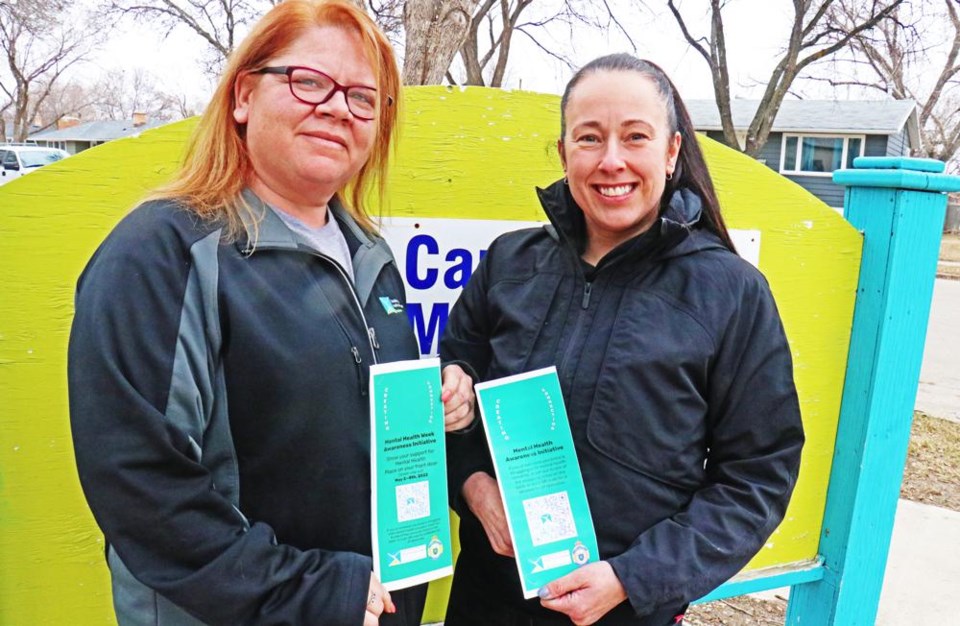WEYBURN – An initiative of the Canadian Mental Health Association and the Weyburn Police Service to distribute door hangers to every household in the city and RM of Weyburn will be exciting for service providers, including Mental Health and Addictions services with the Saskatchewan Health Authority, said the Weyburn manager of services.
The door hanger will include a listing of phone numbers and agency names for residents to consult when they need help or counselling. It will be distributed in Weyburn This Week in the Friday, April 29 issue.
Terry Romanow, manager of Mental Health and Addictions, Southeast Community Health Services for the SHA, is hoping this initiative will let everyone know of what they offer in case they weren’t aware of these services in the community.
The services include adult mental health services for those 18 and over, including specialized services like psychiatry, and the alternatives to violence program, as well as child and youth mental health services for those under 18 years.
Specialized services for children and youth include speech language pathologists, pediatric services for children and their families, the autism program for those 0-19, and addictions services for youth, adults and their families.
“We also have a community recovery team for adults dealing with injurious mental health conditions, and psychiatric services. They do a wide variety of services, assessments and consultations with other programs, and provide medication-based treatment plans,” said Romanow, noting the psychiatrists can make referrals to the mental health inpatient program, for which there is a 10-bed acute-care unit for mental health disorders.
People can be referred to any of the services by a family physician, or they can self-refer to services, with the exception of psychiatric services.
All referrals will go through the intake department for Mental Health and Addictions, and they will do triage and assessments to determine what services will best suit the person, and will make appointments for either an in-person assessment or virtual, or by phone.
In addition, they will make referrals to other agencies, such as Envision Counselling, if that is appropriate.
Of the door hanger initiative, Romanow commented, “I think it’s a really great idea, and I appreciate CMHA for taking this initiative on. I think it brings attention to the services that we provide, or at least a phone number if they’re not aware of the services. It’s a quick guide to everyone to get some support or help with all the different services, like for Envision, and the suicide prevention lines. I think it’s important people have these numbers as well. It’s a great initiative.”
She noted that they partner with CMHA quite often, along with Envision, and with the University of Regina’s Internet-based programs.
The challenges posed by the COVID pandemic are still being dealt with, she noted, pointing out they have seen an increase in the demands for their services, and in the number of higher-risk clients.
Among the challenges were for those who had no cell phones or cell phone-data, making it difficult for providing services virtually, particularly for those who don’t have Internet access.
“We cover the southeast region, from Weyburn to Estevan, and as far north as Kipling and Arcola, so it’s quite a large rural area,” said Romanow, adding there was also a shortage of staff in the last couple of years, sometimes due to the staff or their families having COVID.
Even now, the SHA facilities are not completely back to being open to everyone, she noted, pointing out that masking is still required in all SHA facilities.
They will try to do appointments virtually when they can, but “If people prefer to be seen face-to-face, we will make those appointments, and always if anyone is urgently in need,” she said.
On the other hand, there are people who very much like the virtual services available with the provision of webex, zoom and other similar services that permit people to see each other in real time. For those who live a significant distance from a facility, it works well for them, plus there are times when a storm will come up, such the storm right before Easter which made travelling impossible for some people.
There was a national survey done by the Canadian Centre on Substance Use and Addictions, and the Mental Health and Addictions Commission of Canada, which showed there has been an increase in substance abuse and in suicide ideations, and there has been an increase in stress right across the population in Canada.
“I think (the door hangers) is a good initiative, and I’m really excited about it. We’ll have to watch our numbers as calls come in to see what will happen,” said Romanow. “I’m looking forward to seeing people have that information and to have the ability to contact these services.”




